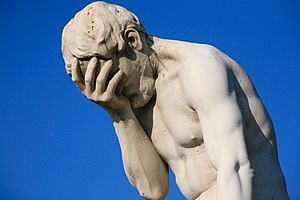The point wasn't anything about life or death. It wasn't about suppressing or stifling anything. It was about the unique combination of qualities such as skill, inherent talent, intelligent creativity and a pursuit of excellence over mediocrity, that those are the marks of the craftsman or artist. Not everybody possesses those attributes. Not everybody is creative in that "overplus" way that fine art and fine craftsmanship will normally express itself.
Just because we think were capable of something and then we assume we are something doesn't make it so, ie. the butcher. The proof of the pudding is in the eating and that's how craftsmanship, whether expressed in a knife a saddle or a gun, etc. is shown to validate it's claim. By those characteristics above being so obvious in it's construction and look.
This is not a new idea. Our predecessors took these thing for granted and insisted they were true.
A friend of mine is a member of the prestigious CA artists group, Loren Entz, artist par excellence, google him. He told me once that as a beginner he took art courses in college. He said that he had to relearn so much on his own later. Why? because, and this is TYPICAL, not the exception, in modern art schools, the attitudes (philosophy) that governs how art schools teach art discourage or are even antagonistic towards realism because they don't like objectivity. I believe they find it threatening to their claims of talent. So... they take the stance that "everybody is an artist and equally talented" and any traditional ideas about what constitutes true art are anathema to that school of thot. I mean, if you can' draw a horse well, evidently you show that you are more talented than someone who cannot. But if you can't draw well, if objective standards that help distinguish between mediocrity vs excellence in any piece of art ( which is always a reflection of talent by the way) are diacarded than we can comfortably believe every drawing or painting ever made is fine art. That was my point. This applies to the skilled crafts as well.
I'm all for everyone liking what they like (or the reverse) but I'm mostly for those who are never really content with mediocrity in their work.
I don't believe it is futile because, as I believe these principles and ideas are true, I believe those who imbibe them, and can apply them to their "natural" talent, they will improve that talent. That's the legacy to leave IMO and I think it's very relevant to the serious knifemaker.
Just because we think were capable of something and then we assume we are something doesn't make it so, ie. the butcher. The proof of the pudding is in the eating and that's how craftsmanship, whether expressed in a knife a saddle or a gun, etc. is shown to validate it's claim. By those characteristics above being so obvious in it's construction and look.
This is not a new idea. Our predecessors took these thing for granted and insisted they were true.
A friend of mine is a member of the prestigious CA artists group, Loren Entz, artist par excellence, google him. He told me once that as a beginner he took art courses in college. He said that he had to relearn so much on his own later. Why? because, and this is TYPICAL, not the exception, in modern art schools, the attitudes (philosophy) that governs how art schools teach art discourage or are even antagonistic towards realism because they don't like objectivity. I believe they find it threatening to their claims of talent. So... they take the stance that "everybody is an artist and equally talented" and any traditional ideas about what constitutes true art are anathema to that school of thot. I mean, if you can' draw a horse well, evidently you show that you are more talented than someone who cannot. But if you can't draw well, if objective standards that help distinguish between mediocrity vs excellence in any piece of art ( which is always a reflection of talent by the way) are diacarded than we can comfortably believe every drawing or painting ever made is fine art. That was my point. This applies to the skilled crafts as well.
I'm all for everyone liking what they like (or the reverse) but I'm mostly for those who are never really content with mediocrity in their work.
I don't believe it is futile because, as I believe these principles and ideas are true, I believe those who imbibe them, and can apply them to their "natural" talent, they will improve that talent. That's the legacy to leave IMO and I think it's very relevant to the serious knifemaker.

